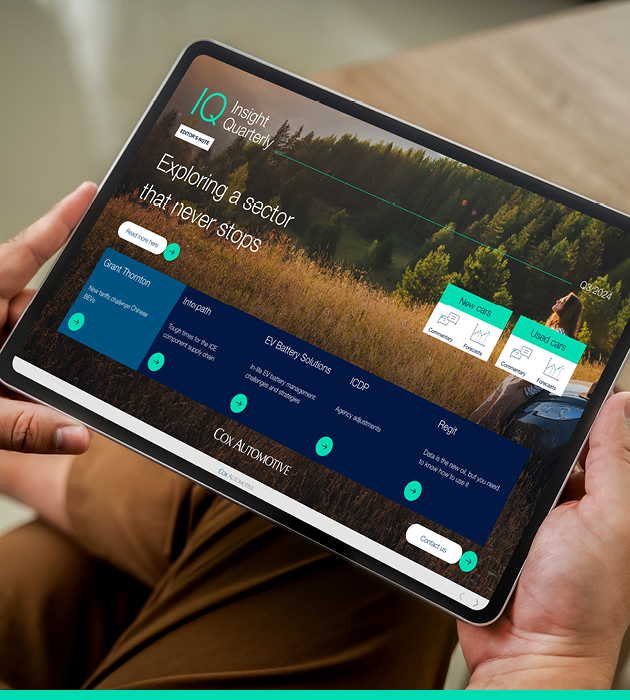Helping you stay informed about the industry’s most important trends & topics.
Discover Insight Quarterly.
- Fourth annual Cox Automotive and Grant Thornton Automotive Insight Report available from 21 October 2021
- Report highlights impact of COVID-19, Brexit, and semiconductor shortages on UK and global new and used car and van markets
- Report features revised 2021 UK new and used car forecast, as well as outlining possible scenarios for 2022 and beyond
The fourth annual Cox Automotive and Grant Thornton Automotive Insight Report, launched today (21 October 2021), suggests the UK new car market will end 2020 on a continued low. On the back of the weakest September for new car registrations since 1998, Cox Automotive and Grant Thornton have revised the year-end forecast down to 1.63m. This is on a par with the record low figures seen in 2020.
Semiconductor chip shortages; issues with rubber, metals, and raw materials; and blockages in the supply chain have all impacted new vehicle production and distribution. This has been combined with aftereffects from Brexit in early 2021, as well as the ongoing challenges of the global COVID-19 pandemic. In spite of a declining market overall, battery-powered vehicles have bucked the trend, with one in five cars registered in the UK in September being zero-emissions capable.
As ever, challenges in the new car sector have had a knock-on effect in the used market, where what used to be a depreciating asset is now going in the opposite direction. While supply constraints are impacting used car transactions, the market is expected to exceed the 2020 year-end figure of 6.75m transactions. The Insight Report 2021 projection for used car transactions in 2021 now sits at 7.14m.
While still tracking behind the 2001-2019 market average of 7.38m used car transactions, this represents a healthy return to growth f, and exceeds the average experienced in the 2008-2014 post-recession period (6.93m). As noted in recent months, short supply in the used market has driven up prices across all stock grades, with a corresponding impact on the change cycles for both fleet and consumer vehicles.
Philip Nothard, Insight and Strategy Director at Cox Automotive, comments: “In the last recession, between 2007 and 2014, the UK used car market realigned for a lower volume of vehicles. However, the fundamental way in which it was structured did not change. The post-COVID-19 automotive market is unlikely to return to a previous norm, especially without further government EV stimulus. It is likely to be 2025 before we see the combined new and used car markets reaching pre-pandemic volume highs. We are entering a new level of used car future values.”
Alongside forecasting the year-end 2021 figures, the Cox Automotive and Grant Thornton Automotive Insight Report also outlines projections for 2022, and possible scenarios for 2023 and beyond. Considering demand drivers such as necessity, affordability, availability, and the economy, the report explores how home working, electrification, the cost of vehicle production, supply chain reconfigurations, and inflation leading to a possible recession may impact on new car registrations through to the end of the decade.
Owen Edwards, Head of Downstream Automotive at Grant Thornton, adds: “The market is constantly changing. There will be further effects from COVID-19. Technological development continues, whether driven through environmental concerns, the financial impetus of ESG policies, regulation of the automotive sector, or demand from consumers. With such rapid transformation taking place, businesses must plan for the future, developing and evolving new business models to cater to the market shifts.”
Although the forecasts are focused on the UK market, the report also explores wider industry trends across Europe, Asia, India, Canada, and the US; highlighting global implications for an automotive sector going through significant revolution. Key market dynamics include the impact of electrification; online retail and digital transformation; connected propositions; the changing shape of mobility solutions post-pandemic; agency model roll-out; as well as changes in the wholesale ecosystem.
To view the full interactive report, click here.
Start your journey
We’re transforming the operations of the world’s leading automotive brands. Get in touch to find out how.




